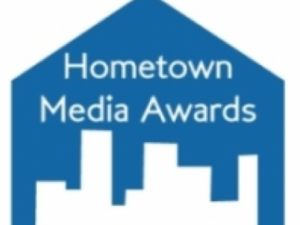
Hometown Video Awards 2014 (Updated)
 Alliance for Community Media’s 2014 Hometown Video Awards are swiftly approaching! This exciting event comes once a year and you don’t want to miss your opportunity to participate. The Hometown Video Awards honors and promotes community media and local cable programs that are first distributed on Public, Educational, and Governmental (PEG) access cable television channels. Awards are presented to creative programs that address community needs, develop diverse community involvement, challenge conventional commercial television formats, and viewers to experience television in a different way.
Alliance for Community Media’s 2014 Hometown Video Awards are swiftly approaching! This exciting event comes once a year and you don’t want to miss your opportunity to participate. The Hometown Video Awards honors and promotes community media and local cable programs that are first distributed on Public, Educational, and Governmental (PEG) access cable television channels. Awards are presented to creative programs that address community needs, develop diverse community involvement, challenge conventional commercial television formats, and viewers to experience television in a different way.
The Hometown Video Awards welcome non-commercial programming from media professionals, non-professionals, and youth. With the exception of the Website categories, programs entered must have had their first telecast on a local cable access channel on or between January 1, 2013 and December 31, 2013. Some categories require specific criteria to be met in order for an entry to be eligible. Be sure to read the category descriptions carefully so that your entry will not be disqualified. All entries must be turned in by April 04, 2014 to acmentry1921@gmail.com Training and Volunteer Services Dept. If you would like to submit more than one (1) episode, please include the fee of $75 per episode with your entry. Your first entry is paid for by MCM. Please contact Mandi Wyndham by email or at 301.424.1730 ext.313 with any questions.
2014 Hometown Video Awards Categories
- Access Center Professional: Programs created by employs of community media or access centers.
- Independent Producer: Programs created by producers independent (no compensation) of community media or access centers.
- Student Division: Programs created by current students enrolled in primary, secondary or undergraduate schools. Non-students may supervise the production, but the overall direction, control of the production and all technical tasks (camera, directing, editing, sound, etc.) must be performed by the youth involved.
.
STANDARD CATEGORIES
Please read each category description carefully. Some categories have special requirements.
- About Access & Empowerment: created to inform the viewer about an access center, access channel, or the concept of public, educational, or government access; programs that exemplify how community access television empowers people to speak about issues that affect them.
- Access-Able: produced by individuals with developmental or physical challenges about disability issues and concerns.
- Access Program Promo: short promotional video, less than 5 minutes, about an access program or channel.
- Animation: complete programs created using 2D or 3D animation techniques like stop action, clay-mation, wireframe, etc. Opening and closing title sequences from other types of programs are not eligible for this category.
- Children’s Programs: informational or entertainment programs targeted for audiences of children 12 years old and younger.
- Community Events: coverage of parades, festivals, awards ceremonies and special community events.
- Cultural Perspectives: programs that celebrate our differences and enhance our appreciation of diverse ethnic and cultural groups or lead to greater understanding of foreign countries their people and customs. Transcripts or subtitles are required for programs in a language other than English.
- Democracy in Action: programs that cover national, state, or local elections including interviews, commentary, debates, and candidate forums.
- Documentary: documentary format programs about an event, occurrence or issue of social importance.
- Documentary Biography: documentary format programs that examine a person or organization.
- Educational Activities: videos that describe school sponsored programs or feature events, other than sports or performing arts, which are sponsored by educational institutions or school districts.
- Educational Profile: programs that promote educational institutions or showcase the school or district students or employees at work.
- Entertainment & Arts: programs designed to entertain and amuse including visual, media or performance arts, sports commentary and entertainment talk shows.
- GLBT Programming: programs created about subjects of interest or concern to gay, lesbian, bisexual or transgender people.
- Government Activities: videos that describe government programs and services or feature events sponsored by government agencies.
- Government Profile: programs that feature government departments or showcase government employees at work.
- Informational Talk Show: discussion programs or interviews designed to inform the viewers about a specific topic. Program is shot in studio or on location with limited roll-in footage.
- Instructional/Training: provides “how to” advice or teaches a subject or skill.
- Live Format: programming, other than local news, that originally aired “live” and is submitted with no post-production editing.
- Local Performances: music concerts, plays, or dance performances videotaped at a local performance venue or in a television studio.
- Magazine Shows: programs comprised of several pre-produced segments or stories on a different topics that are introduced by a host or narrative.
- Music Video: features the creative fusion of original music and video images.
- News: regularly scheduled programs providing coverage of local issues, people, places and events through reports, interviews, and video clips.
- Original Teleplay: presentation of an original comedy or dramatic script written for television.
- Public Service Announcements: short videos, less than 1 minute in length, promoting a community event or organization or presenting a particular social message.
- Seniors: programs about topics of interest or concern to senior audiences.
- Web Based Program: informational or entertaining programs designed and intended for internet streaming rather than cablecast.
- Spiritual / Inspirational: deals with religion, or spirituality, or acknowledges a connection with a higher power.
- Sports Coverage: “game of the week” or coverage of a sports activity or sports competition.
- Website for Producers: Website developed to promote a producer’s program. Website must be a stand-alone site that is NOT affiliated with a social network like Facebook or MySpace. Enter the URL of your site as the Program Title on the entry form and provide a print of the home page.
- Website for Access Centers: Web sites developed for access centers. Website must be a stand-alone site that is NOT affiliated with a social network like Facebook or MySpace. Enter the URL of your site as the Program Title on the entry form and provide a print of the home page with your supporting documentation.
Conference information can be found at www.allcommunitymedia.org.

Engage us on Facebook
Follow us on Twitter
Tweets by @mymcmedia